BTEC Higher National Assignment
VerifiedAdded on 2020/10/19
|12
|2495
|53
AI Summary
This document outlines the key terms, concepts, and types of evidence used in BTEC Higher National assignments. It covers various skills, such as critically analysing, evaluating, explaining, illustrating, justifying, outlining, planning, producing, reconstructing, reporting, reviewing, showing how, staging and managing, stating, suggesting, undertaking, and using different types of evidence like case studies, projects, independent research, written tasks, simulated activities, team tasks, presentations, production of plans, reflective journals, and posters/leaflets. The document aims to provide a comprehensive guide for students preparing for BTEC Higher National assignments.
Contribute Materials
Your contribution can guide someone’s learning journey. Share your
documents today.
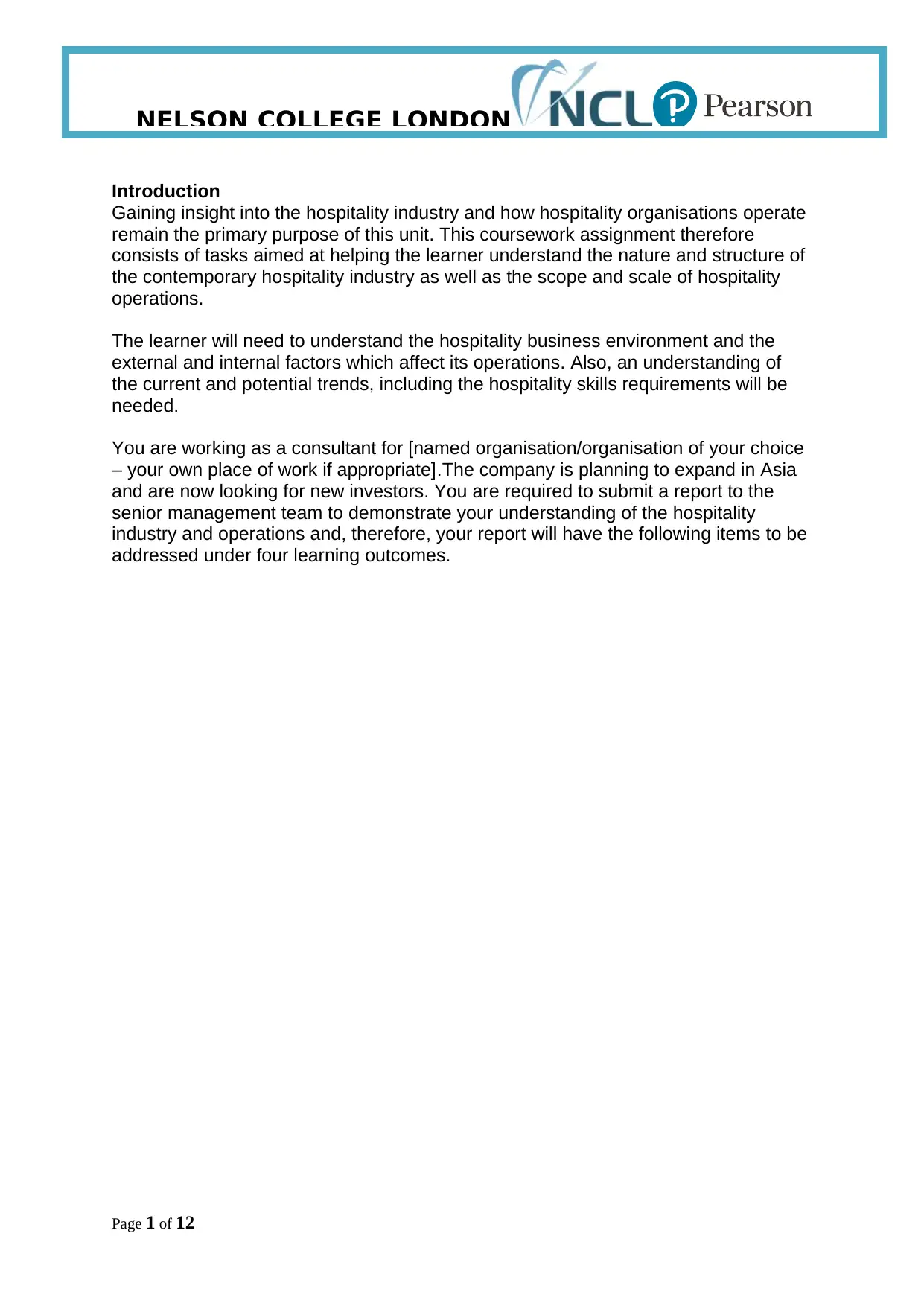
NELSON COLLEGE LONDON
Introduction
Gaining insight into the hospitality industry and how hospitality organisations operate
remain the primary purpose of this unit. This coursework assignment therefore
consists of tasks aimed at helping the learner understand the nature and structure of
the contemporary hospitality industry as well as the scope and scale of hospitality
operations.
The learner will need to understand the hospitality business environment and the
external and internal factors which affect its operations. Also, an understanding of
the current and potential trends, including the hospitality skills requirements will be
needed.
You are working as a consultant for [named organisation/organisation of your choice
– your own place of work if appropriate].The company is planning to expand in Asia
and are now looking for new investors. You are required to submit a report to the
senior management team to demonstrate your understanding of the hospitality
industry and operations and, therefore, your report will have the following items to be
addressed under four learning outcomes.
Page 1 of 12
Introduction
Gaining insight into the hospitality industry and how hospitality organisations operate
remain the primary purpose of this unit. This coursework assignment therefore
consists of tasks aimed at helping the learner understand the nature and structure of
the contemporary hospitality industry as well as the scope and scale of hospitality
operations.
The learner will need to understand the hospitality business environment and the
external and internal factors which affect its operations. Also, an understanding of
the current and potential trends, including the hospitality skills requirements will be
needed.
You are working as a consultant for [named organisation/organisation of your choice
– your own place of work if appropriate].The company is planning to expand in Asia
and are now looking for new investors. You are required to submit a report to the
senior management team to demonstrate your understanding of the hospitality
industry and operations and, therefore, your report will have the following items to be
addressed under four learning outcomes.
Page 1 of 12
Secure Best Marks with AI Grader
Need help grading? Try our AI Grader for instant feedback on your assignments.
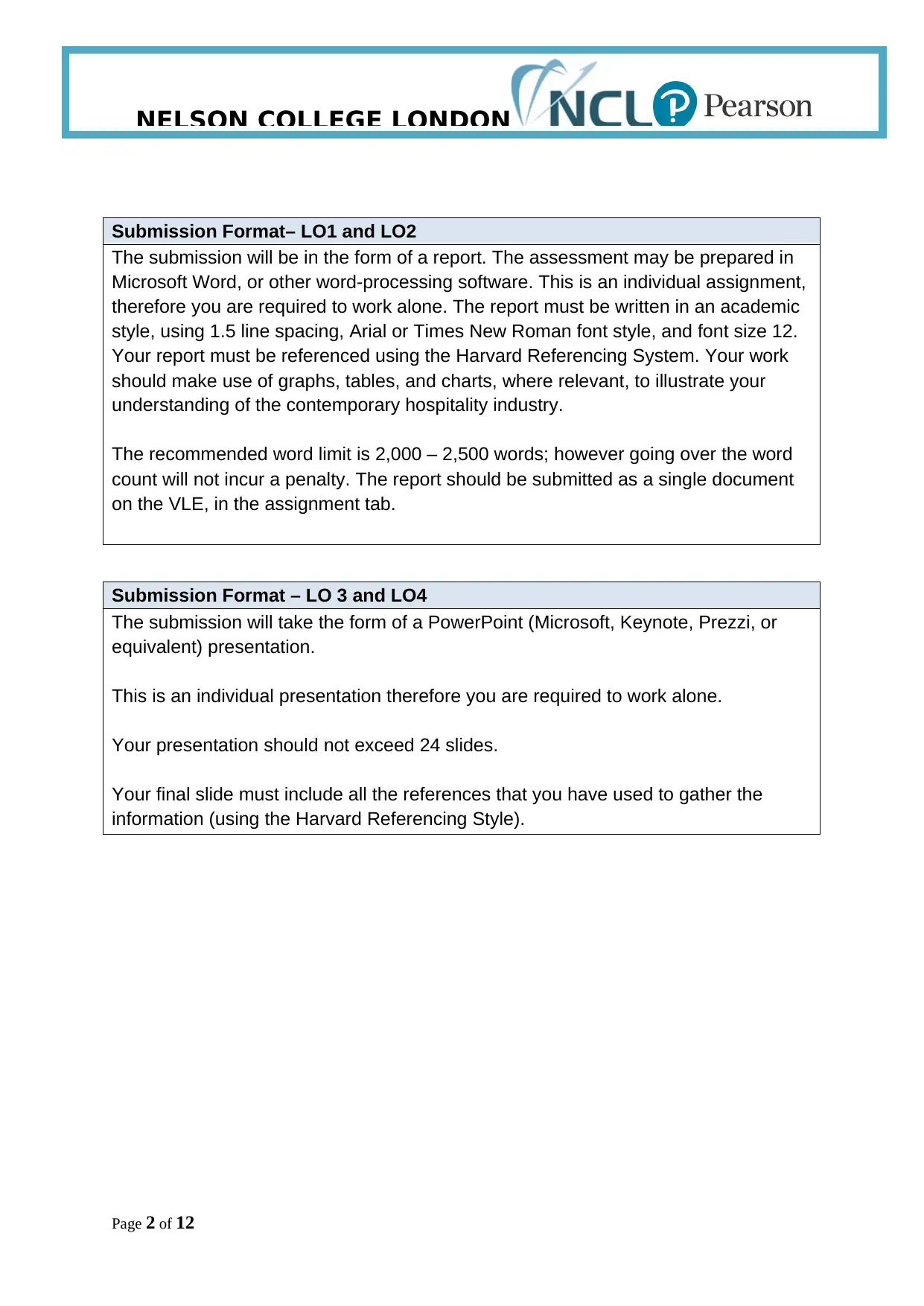
NELSON COLLEGE LONDON
Submission Format– LO1 and LO2
The submission will be in the form of a report. The assessment may be prepared in
Microsoft Word, or other word-processing software. This is an individual assignment,
therefore you are required to work alone. The report must be written in an academic
style, using 1.5 line spacing, Arial or Times New Roman font style, and font size 12.
Your report must be referenced using the Harvard Referencing System. Your work
should make use of graphs, tables, and charts, where relevant, to illustrate your
understanding of the contemporary hospitality industry.
The recommended word limit is 2,000 – 2,500 words; however going over the word
count will not incur a penalty. The report should be submitted as a single document
on the VLE, in the assignment tab.
Submission Format – LO 3 and LO4
The submission will take the form of a PowerPoint (Microsoft, Keynote, Prezzi, or
equivalent) presentation.
This is an individual presentation therefore you are required to work alone.
Your presentation should not exceed 24 slides.
Your final slide must include all the references that you have used to gather the
information (using the Harvard Referencing Style).
Page 2 of 12
Submission Format– LO1 and LO2
The submission will be in the form of a report. The assessment may be prepared in
Microsoft Word, or other word-processing software. This is an individual assignment,
therefore you are required to work alone. The report must be written in an academic
style, using 1.5 line spacing, Arial or Times New Roman font style, and font size 12.
Your report must be referenced using the Harvard Referencing System. Your work
should make use of graphs, tables, and charts, where relevant, to illustrate your
understanding of the contemporary hospitality industry.
The recommended word limit is 2,000 – 2,500 words; however going over the word
count will not incur a penalty. The report should be submitted as a single document
on the VLE, in the assignment tab.
Submission Format – LO 3 and LO4
The submission will take the form of a PowerPoint (Microsoft, Keynote, Prezzi, or
equivalent) presentation.
This is an individual presentation therefore you are required to work alone.
Your presentation should not exceed 24 slides.
Your final slide must include all the references that you have used to gather the
information (using the Harvard Referencing Style).
Page 2 of 12

NELSON COLLEGE LONDON
Unit Learning Outcomes
LO1 Examine the current structure, scope and size of the hospitality industry
LO2 Explore current and anticipated skills requirements in the hospitality industry
Assignment Brief and Guidance
Scenario and Activity:
You work as a consultant for [named organisation/organisation of your choice –
your own place of work if appropriate].The company is planning to expand in Asia
and are now looking for new investors. The group is holding an event to encourage
investors to support their new projects in hospitality. The investors would like to
know more about the hospitality industry before they invest. Your manager has
discussed this with you and asked you to write a report to present to the investors.
In your report, you should:
Explore a number of different types of business within the hospitality
industry and the diverse products and services that they offer
Examine a range of operational and functional departments within a
chosen hospitality business
Discuss the contribution of the hospitality industry to local, national and
international economies
Review the interrelationships of the operational and functional units
within a chosen hospitality business
Assess how the use of franchising and licensing agreements has
influenced the global development of the hospitality industry
Analyse how global growth, franchising and licensing developments
have contributed to the economic worth of the hospitality industry
Investigate a range of different operational roles within the hospitality
industry
Examine the skills required for roles within the hospitality industry and
current skills shortages
Review the skills gaps within the hospitality industry in relation to a
range of different operational roles
Analyse the impact that skills gaps have on hospitality businesses and
make valid solutions for addressing these skills gaps
Unit Learning Outcomes
Page 3 of 12
Unit Learning Outcomes
LO1 Examine the current structure, scope and size of the hospitality industry
LO2 Explore current and anticipated skills requirements in the hospitality industry
Assignment Brief and Guidance
Scenario and Activity:
You work as a consultant for [named organisation/organisation of your choice –
your own place of work if appropriate].The company is planning to expand in Asia
and are now looking for new investors. The group is holding an event to encourage
investors to support their new projects in hospitality. The investors would like to
know more about the hospitality industry before they invest. Your manager has
discussed this with you and asked you to write a report to present to the investors.
In your report, you should:
Explore a number of different types of business within the hospitality
industry and the diverse products and services that they offer
Examine a range of operational and functional departments within a
chosen hospitality business
Discuss the contribution of the hospitality industry to local, national and
international economies
Review the interrelationships of the operational and functional units
within a chosen hospitality business
Assess how the use of franchising and licensing agreements has
influenced the global development of the hospitality industry
Analyse how global growth, franchising and licensing developments
have contributed to the economic worth of the hospitality industry
Investigate a range of different operational roles within the hospitality
industry
Examine the skills required for roles within the hospitality industry and
current skills shortages
Review the skills gaps within the hospitality industry in relation to a
range of different operational roles
Analyse the impact that skills gaps have on hospitality businesses and
make valid solutions for addressing these skills gaps
Unit Learning Outcomes
Page 3 of 12
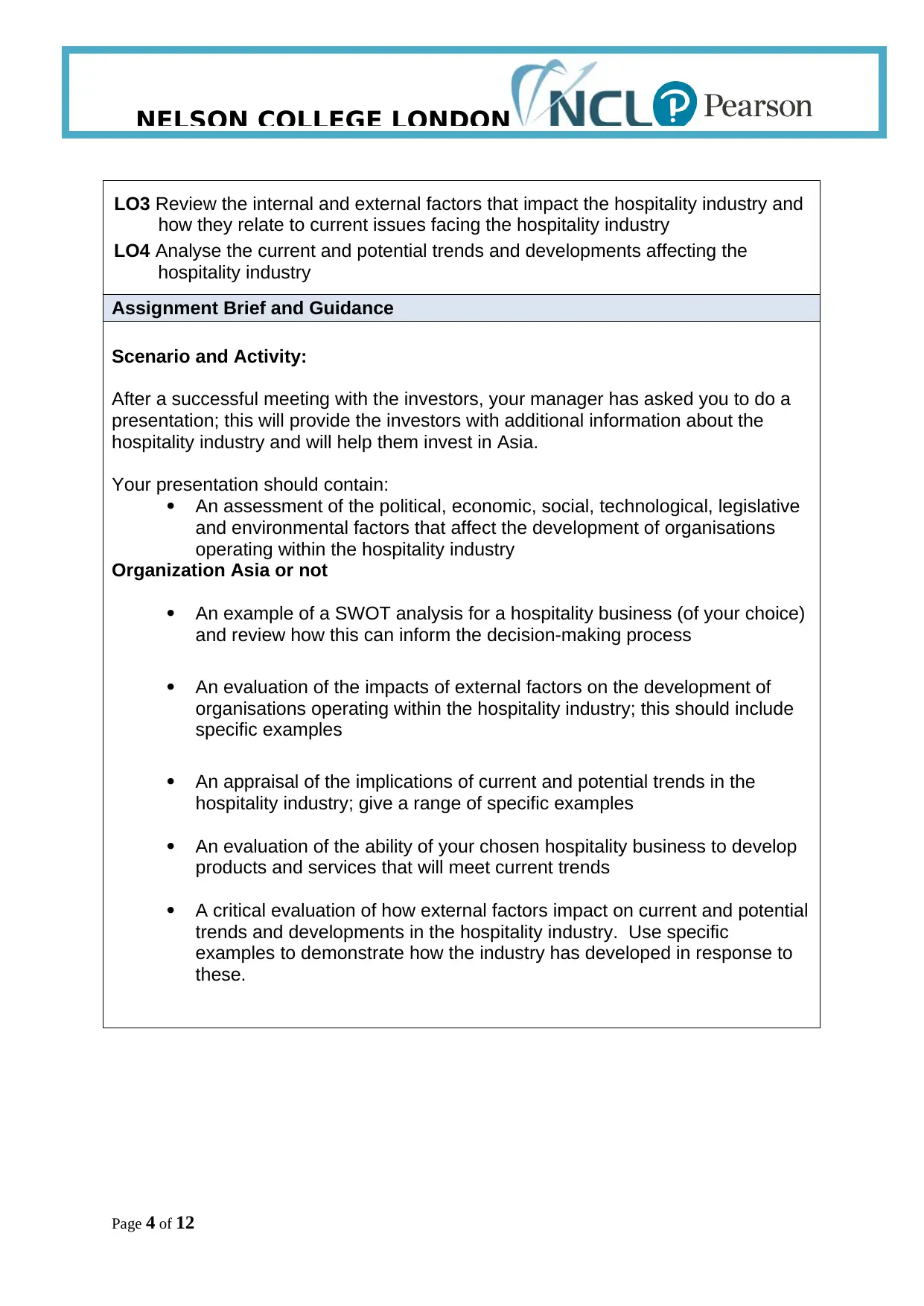
NELSON COLLEGE LONDON
LO3 Review the internal and external factors that impact the hospitality industry and
how they relate to current issues facing the hospitality industry
LO4 Analyse the current and potential trends and developments affecting the
hospitality industry
Assignment Brief and Guidance
Scenario and Activity:
After a successful meeting with the investors, your manager has asked you to do a
presentation; this will provide the investors with additional information about the
hospitality industry and will help them invest in Asia.
Your presentation should contain:
An assessment of the political, economic, social, technological, legislative
and environmental factors that affect the development of organisations
operating within the hospitality industry
Organization Asia or not
An example of a SWOT analysis for a hospitality business (of your choice)
and review how this can inform the decision-making process
An evaluation of the impacts of external factors on the development of
organisations operating within the hospitality industry; this should include
specific examples
An appraisal of the implications of current and potential trends in the
hospitality industry; give a range of specific examples
An evaluation of the ability of your chosen hospitality business to develop
products and services that will meet current trends
A critical evaluation of how external factors impact on current and potential
trends and developments in the hospitality industry. Use specific
examples to demonstrate how the industry has developed in response to
these.
Page 4 of 12
LO3 Review the internal and external factors that impact the hospitality industry and
how they relate to current issues facing the hospitality industry
LO4 Analyse the current and potential trends and developments affecting the
hospitality industry
Assignment Brief and Guidance
Scenario and Activity:
After a successful meeting with the investors, your manager has asked you to do a
presentation; this will provide the investors with additional information about the
hospitality industry and will help them invest in Asia.
Your presentation should contain:
An assessment of the political, economic, social, technological, legislative
and environmental factors that affect the development of organisations
operating within the hospitality industry
Organization Asia or not
An example of a SWOT analysis for a hospitality business (of your choice)
and review how this can inform the decision-making process
An evaluation of the impacts of external factors on the development of
organisations operating within the hospitality industry; this should include
specific examples
An appraisal of the implications of current and potential trends in the
hospitality industry; give a range of specific examples
An evaluation of the ability of your chosen hospitality business to develop
products and services that will meet current trends
A critical evaluation of how external factors impact on current and potential
trends and developments in the hospitality industry. Use specific
examples to demonstrate how the industry has developed in response to
these.
Page 4 of 12
Secure Best Marks with AI Grader
Need help grading? Try our AI Grader for instant feedback on your assignments.

NELSON COLLEGE LONDON
Submission Instructions:
Reasonable consideration will be given in the case of failure to submit the
assignments on time due to any medical reasons (provided sufficient medical
proof is made available at the time of exemption).
Students who are claiming extenuating or mitigating circumstances for
resubmission will not be awarded Merit and Distinction grade in a subsequent
reassessment of that unit.
The assignment (LO1 & LO2) should be completed in an appropriate format using
1.5 line spacing, Ariel font style, and font size 12.
The assignment should be uploaded to the VLE, to the Assignment tab.
Referencing should be provided using the Harvard Referencing Style. The link
below will provide you with the correct way to reference your work:
https://qualifications.pearson.com/content/dam/pdf/BTEC-Higher-Nationals/
Advanced-Practice-in-Early-Years-Education/2016/Specification/
Pearson_Guide_to_Harvard_Referencing.pdf
The assignment (LO3 & LO4) should be prepared as a Microsoft PowerPoint (or
Keynote, Prezzi, or equivalent) presentation; this should be uploaded to the VLE,
to the Individual Presentation tab.
Page 5 of 12
Submission Instructions:
Reasonable consideration will be given in the case of failure to submit the
assignments on time due to any medical reasons (provided sufficient medical
proof is made available at the time of exemption).
Students who are claiming extenuating or mitigating circumstances for
resubmission will not be awarded Merit and Distinction grade in a subsequent
reassessment of that unit.
The assignment (LO1 & LO2) should be completed in an appropriate format using
1.5 line spacing, Ariel font style, and font size 12.
The assignment should be uploaded to the VLE, to the Assignment tab.
Referencing should be provided using the Harvard Referencing Style. The link
below will provide you with the correct way to reference your work:
https://qualifications.pearson.com/content/dam/pdf/BTEC-Higher-Nationals/
Advanced-Practice-in-Early-Years-Education/2016/Specification/
Pearson_Guide_to_Harvard_Referencing.pdf
The assignment (LO3 & LO4) should be prepared as a Microsoft PowerPoint (or
Keynote, Prezzi, or equivalent) presentation; this should be uploaded to the VLE,
to the Individual Presentation tab.
Page 5 of 12

NELSON COLLEGE LONDON
Appendix A: Plagiarism and Collusion
Students are referred to the College’s policy of Plagiarism and Collusion, as detailed
during interview and induction and as included in the Students’ Handbook.
Students are reminded that persistent offences in this area will result in the student’s
termination.
Any act of plagiarism and collusion will be seriously dealt with according to the
regulations. In this context, the definition and scope of plagiarism are presented
below:
“Using the work of others without acknowledging source of information or inspiration
is regarded as plagiarism. Even if the words are changed or sentences are put in
different order, the result is still plagiarism” (Cortell, 2003).
Collusion is the submission of work/assignment produced in collaboration with
another student or students. Where one person shares his/her work with others who
submit part or all of it as their own work, then the incidence of collusion is
established.
Appendix B: Harvard Referencing System
Any information that is not yours needs to be referenced or else turns to be
plagiarism.
The authors and publication information cited within the main body of your work must
be listed in the reference list. For example:
Bell, J. (1999) ‘Doing your research Project’. (3rd Ed) Buckingham: Open University
Press
For example
According to Bell (1999), as you write up your research you will use a citation to
indicate in your text the source of piece of information.
The authors and publication information cited within the main body of your work must
be listed in the reference list. For example:
Page 6 of 12
Appendix A: Plagiarism and Collusion
Students are referred to the College’s policy of Plagiarism and Collusion, as detailed
during interview and induction and as included in the Students’ Handbook.
Students are reminded that persistent offences in this area will result in the student’s
termination.
Any act of plagiarism and collusion will be seriously dealt with according to the
regulations. In this context, the definition and scope of plagiarism are presented
below:
“Using the work of others without acknowledging source of information or inspiration
is regarded as plagiarism. Even if the words are changed or sentences are put in
different order, the result is still plagiarism” (Cortell, 2003).
Collusion is the submission of work/assignment produced in collaboration with
another student or students. Where one person shares his/her work with others who
submit part or all of it as their own work, then the incidence of collusion is
established.
Appendix B: Harvard Referencing System
Any information that is not yours needs to be referenced or else turns to be
plagiarism.
The authors and publication information cited within the main body of your work must
be listed in the reference list. For example:
Bell, J. (1999) ‘Doing your research Project’. (3rd Ed) Buckingham: Open University
Press
For example
According to Bell (1999), as you write up your research you will use a citation to
indicate in your text the source of piece of information.
The authors and publication information cited within the main body of your work must
be listed in the reference list. For example:
Page 6 of 12
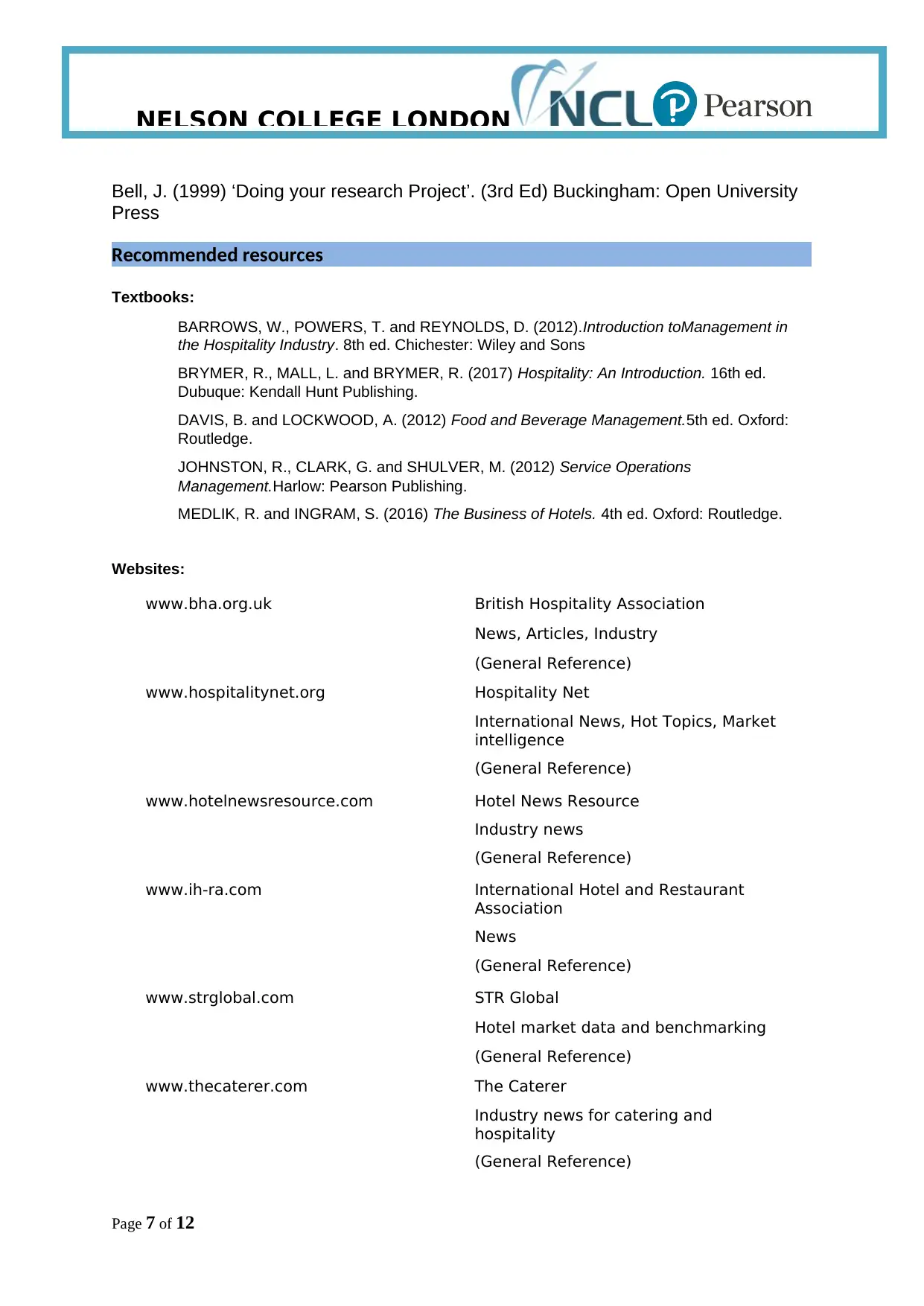
NELSON COLLEGE LONDON
Bell, J. (1999) ‘Doing your research Project’. (3rd Ed) Buckingham: Open University
Press
Recommended resources
Textbooks:
BARROWS, W., POWERS, T. and REYNOLDS, D. (2012).Introduction toManagement in
the Hospitality Industry. 8th ed. Chichester: Wiley and Sons
BRYMER, R., MALL, L. and BRYMER, R. (2017) Hospitality: An Introduction. 16th ed.
Dubuque: Kendall Hunt Publishing.
DAVIS, B. and LOCKWOOD, A. (2012) Food and Beverage Management.5th ed. Oxford:
Routledge.
JOHNSTON, R., CLARK, G. and SHULVER, M. (2012) Service Operations
Management.Harlow: Pearson Publishing.
MEDLIK, R. and INGRAM, S. (2016) The Business of Hotels. 4th ed. Oxford: Routledge.
Websites:
www.bha.org.uk British Hospitality Association
News, Articles, Industry
(General Reference)
www.hospitalitynet.org Hospitality Net
International News, Hot Topics, Market
intelligence
(General Reference)
www.hotelnewsresource.com Hotel News Resource
Industry news
(General Reference)
www.ih-ra.com International Hotel and Restaurant
Association
News
(General Reference)
www.strglobal.com STR Global
Hotel market data and benchmarking
(General Reference)
www.thecaterer.com The Caterer
Industry news for catering and
hospitality
(General Reference)
Page 7 of 12
Bell, J. (1999) ‘Doing your research Project’. (3rd Ed) Buckingham: Open University
Press
Recommended resources
Textbooks:
BARROWS, W., POWERS, T. and REYNOLDS, D. (2012).Introduction toManagement in
the Hospitality Industry. 8th ed. Chichester: Wiley and Sons
BRYMER, R., MALL, L. and BRYMER, R. (2017) Hospitality: An Introduction. 16th ed.
Dubuque: Kendall Hunt Publishing.
DAVIS, B. and LOCKWOOD, A. (2012) Food and Beverage Management.5th ed. Oxford:
Routledge.
JOHNSTON, R., CLARK, G. and SHULVER, M. (2012) Service Operations
Management.Harlow: Pearson Publishing.
MEDLIK, R. and INGRAM, S. (2016) The Business of Hotels. 4th ed. Oxford: Routledge.
Websites:
www.bha.org.uk British Hospitality Association
News, Articles, Industry
(General Reference)
www.hospitalitynet.org Hospitality Net
International News, Hot Topics, Market
intelligence
(General Reference)
www.hotelnewsresource.com Hotel News Resource
Industry news
(General Reference)
www.ih-ra.com International Hotel and Restaurant
Association
News
(General Reference)
www.strglobal.com STR Global
Hotel market data and benchmarking
(General Reference)
www.thecaterer.com The Caterer
Industry news for catering and
hospitality
(General Reference)
Page 7 of 12
Paraphrase This Document
Need a fresh take? Get an instant paraphrase of this document with our AI Paraphraser
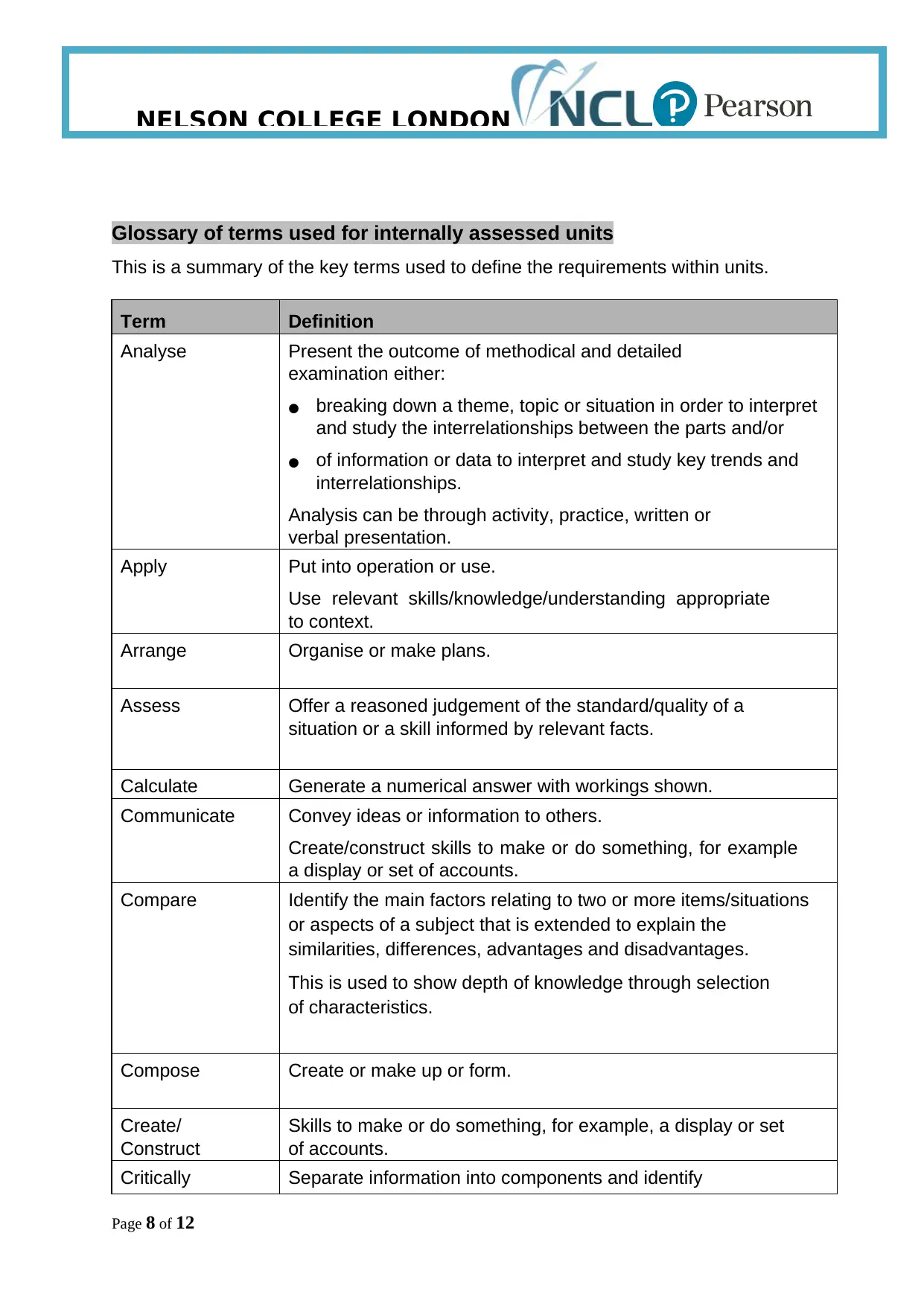
NELSON COLLEGE LONDON
Glossary of terms used for internally assessed units
This is a summary of the key terms used to define the requirements within units.
Term Definition
Analyse Present the outcome of methodical and detailed
examination either:
● breaking down a theme, topic or situation in order to interpret
and study the interrelationships between the parts and/or
● of information or data to interpret and study key trends and
interrelationships.
Analysis can be through activity, practice, written or
verbal presentation.
Apply Put into operation or use.
Use relevant skills/knowledge/understanding appropriate
to context.
Arrange Organise or make plans.
Assess Offer a reasoned judgement of the standard/quality of a
situation or a skill informed by relevant facts.
Calculate Generate a numerical answer with workings shown.
Communicate Convey ideas or information to others.
Create/construct skills to make or do something, for example
a display or set of accounts.
Compare Identify the main factors relating to two or more items/situations
or aspects of a subject that is extended to explain the
similarities, differences, advantages and disadvantages.
This is used to show depth of knowledge through selection
of characteristics.
Compose Create or make up or form.
Create/
Construct
Skills to make or do something, for example, a display or set
of accounts.
Critically Separate information into components and identify
Page 8 of 12
Glossary of terms used for internally assessed units
This is a summary of the key terms used to define the requirements within units.
Term Definition
Analyse Present the outcome of methodical and detailed
examination either:
● breaking down a theme, topic or situation in order to interpret
and study the interrelationships between the parts and/or
● of information or data to interpret and study key trends and
interrelationships.
Analysis can be through activity, practice, written or
verbal presentation.
Apply Put into operation or use.
Use relevant skills/knowledge/understanding appropriate
to context.
Arrange Organise or make plans.
Assess Offer a reasoned judgement of the standard/quality of a
situation or a skill informed by relevant facts.
Calculate Generate a numerical answer with workings shown.
Communicate Convey ideas or information to others.
Create/construct skills to make or do something, for example
a display or set of accounts.
Compare Identify the main factors relating to two or more items/situations
or aspects of a subject that is extended to explain the
similarities, differences, advantages and disadvantages.
This is used to show depth of knowledge through selection
of characteristics.
Compose Create or make up or form.
Create/
Construct
Skills to make or do something, for example, a display or set
of accounts.
Critically Separate information into components and identify
Page 8 of 12
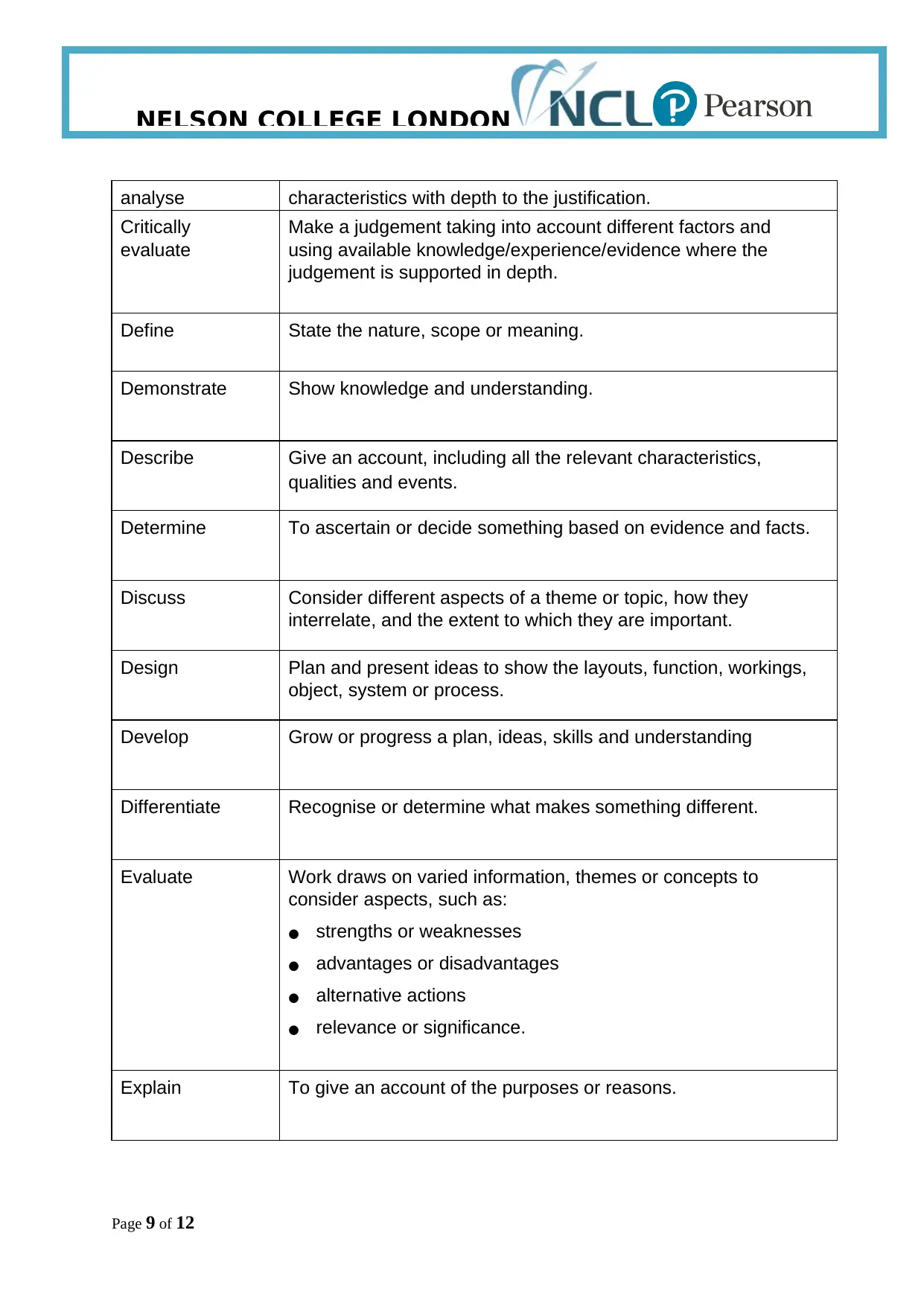
NELSON COLLEGE LONDON
analyse characteristics with depth to the justification.
Critically
evaluate
Make a judgement taking into account different factors and
using available knowledge/experience/evidence where the
judgement is supported in depth.
Define State the nature, scope or meaning.
Demonstrate Show knowledge and understanding.
Describe Give an account, including all the relevant characteristics,
qualities and events.
Determine To ascertain or decide something based on evidence and facts.
Discuss Consider different aspects of a theme or topic, how they
interrelate, and the extent to which they are important.
Design Plan and present ideas to show the layouts, function, workings,
object, system or process.
Develop Grow or progress a plan, ideas, skills and understanding
Differentiate Recognise or determine what makes something different.
Evaluate Work draws on varied information, themes or concepts to
consider aspects, such as:
● strengths or weaknesses
● advantages or disadvantages
● alternative actions
● relevance or significance.
Explain To give an account of the purposes or reasons.
Page 9 of 12
analyse characteristics with depth to the justification.
Critically
evaluate
Make a judgement taking into account different factors and
using available knowledge/experience/evidence where the
judgement is supported in depth.
Define State the nature, scope or meaning.
Demonstrate Show knowledge and understanding.
Describe Give an account, including all the relevant characteristics,
qualities and events.
Determine To ascertain or decide something based on evidence and facts.
Discuss Consider different aspects of a theme or topic, how they
interrelate, and the extent to which they are important.
Design Plan and present ideas to show the layouts, function, workings,
object, system or process.
Develop Grow or progress a plan, ideas, skills and understanding
Differentiate Recognise or determine what makes something different.
Evaluate Work draws on varied information, themes or concepts to
consider aspects, such as:
● strengths or weaknesses
● advantages or disadvantages
● alternative actions
● relevance or significance.
Explain To give an account of the purposes or reasons.
Page 9 of 12

NELSON COLLEGE LONDON
Explore Skills and/or knowledge involving practical research or testing.
Identify Indicate the main features or purpose of something by
recognising it and/or being able to discern and understand facts
or qualities.
Illustrate Make clear by using examples or provide diagrams.
Indicate Point out, show.
Interpret State the meaning, purpose or qualities of something through
the use of images, words or other expression.
Investigate Conduct an inquiry or study into something to discover and
examine facts and information.
Justify Students give reasons or evidence to:
● support an opinion
● prove something is right or reasonable.
Outline Set out the main points/characteristics.
Plan Consider, set out and communicate what is to be done.
Produce To bring into existence.
Reconstruct To assemble again/reorganise/form an impression.
Report Adhere to protocols, codes and conventions where findings or
judgements are set down in an objective way.
Review Make a formal assessment of work produced. The assessment
allows students to:
● appraise existing information or prior events
Page 10 of 12
Explore Skills and/or knowledge involving practical research or testing.
Identify Indicate the main features or purpose of something by
recognising it and/or being able to discern and understand facts
or qualities.
Illustrate Make clear by using examples or provide diagrams.
Indicate Point out, show.
Interpret State the meaning, purpose or qualities of something through
the use of images, words or other expression.
Investigate Conduct an inquiry or study into something to discover and
examine facts and information.
Justify Students give reasons or evidence to:
● support an opinion
● prove something is right or reasonable.
Outline Set out the main points/characteristics.
Plan Consider, set out and communicate what is to be done.
Produce To bring into existence.
Reconstruct To assemble again/reorganise/form an impression.
Report Adhere to protocols, codes and conventions where findings or
judgements are set down in an objective way.
Review Make a formal assessment of work produced. The assessment
allows students to:
● appraise existing information or prior events
Page 10 of 12
Secure Best Marks with AI Grader
Need help grading? Try our AI Grader for instant feedback on your assignments.
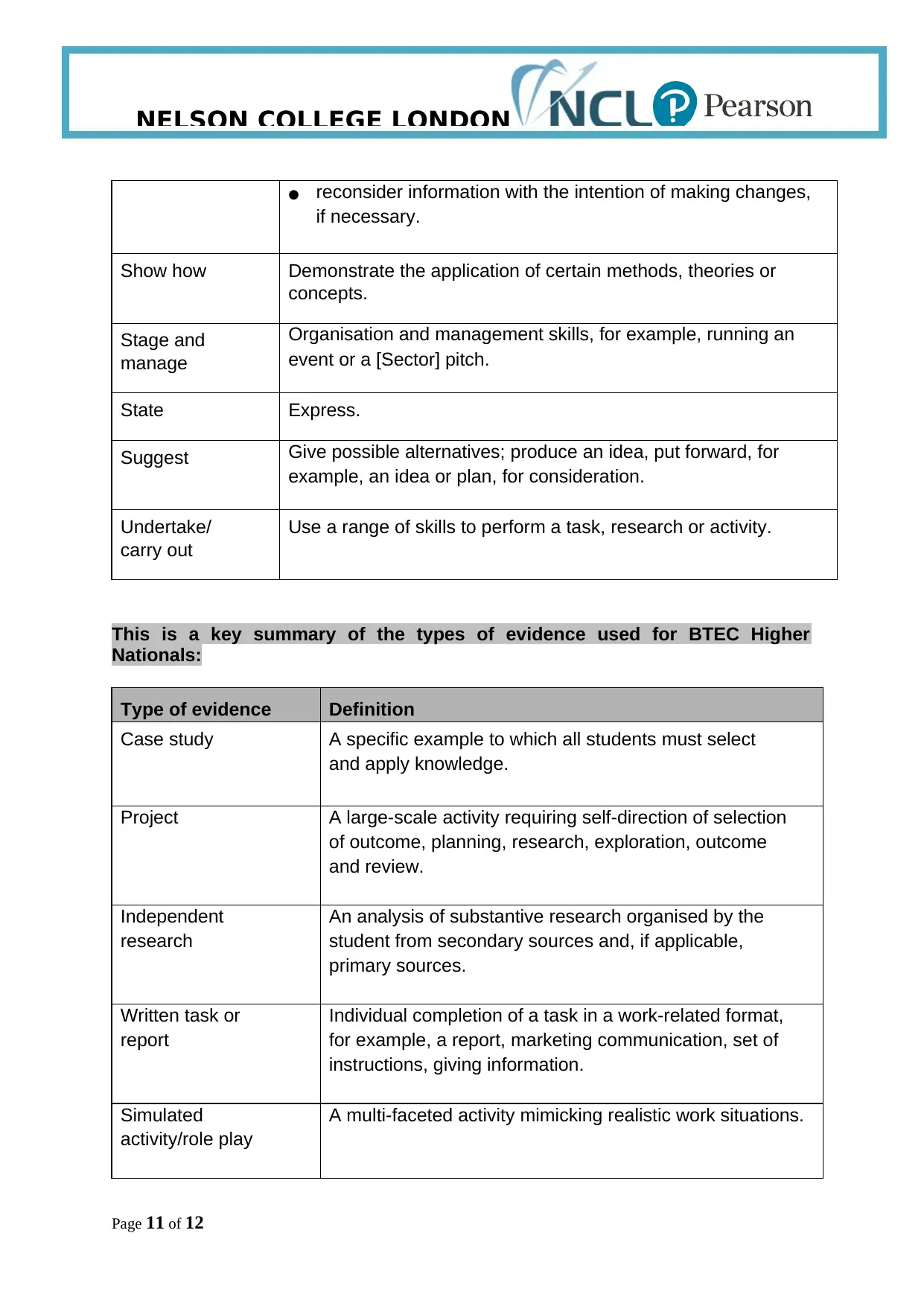
NELSON COLLEGE LONDON
● reconsider information with the intention of making changes,
if necessary.
Show how Demonstrate the application of certain methods, theories or
concepts.
Stage and
manage
Organisation and management skills, for example, running an
event or a [Sector] pitch.
State Express.
Suggest Give possible alternatives; produce an idea, put forward, for
example, an idea or plan, for consideration.
Undertake/
carry out
Use a range of skills to perform a task, research or activity.
This is a key summary of the types of evidence used for BTEC Higher
Nationals:
Type of evidence Definition
Case study A specific example to which all students must select
and apply knowledge.
Project A large-scale activity requiring self-direction of selection
of outcome, planning, research, exploration, outcome
and review.
Independent
research
An analysis of substantive research organised by the
student from secondary sources and, if applicable,
primary sources.
Written task or
report
Individual completion of a task in a work-related format,
for example, a report, marketing communication, set of
instructions, giving information.
Simulated
activity/role play
A multi-faceted activity mimicking realistic work situations.
Page 11 of 12
● reconsider information with the intention of making changes,
if necessary.
Show how Demonstrate the application of certain methods, theories or
concepts.
Stage and
manage
Organisation and management skills, for example, running an
event or a [Sector] pitch.
State Express.
Suggest Give possible alternatives; produce an idea, put forward, for
example, an idea or plan, for consideration.
Undertake/
carry out
Use a range of skills to perform a task, research or activity.
This is a key summary of the types of evidence used for BTEC Higher
Nationals:
Type of evidence Definition
Case study A specific example to which all students must select
and apply knowledge.
Project A large-scale activity requiring self-direction of selection
of outcome, planning, research, exploration, outcome
and review.
Independent
research
An analysis of substantive research organised by the
student from secondary sources and, if applicable,
primary sources.
Written task or
report
Individual completion of a task in a work-related format,
for example, a report, marketing communication, set of
instructions, giving information.
Simulated
activity/role play
A multi-faceted activity mimicking realistic work situations.
Page 11 of 12
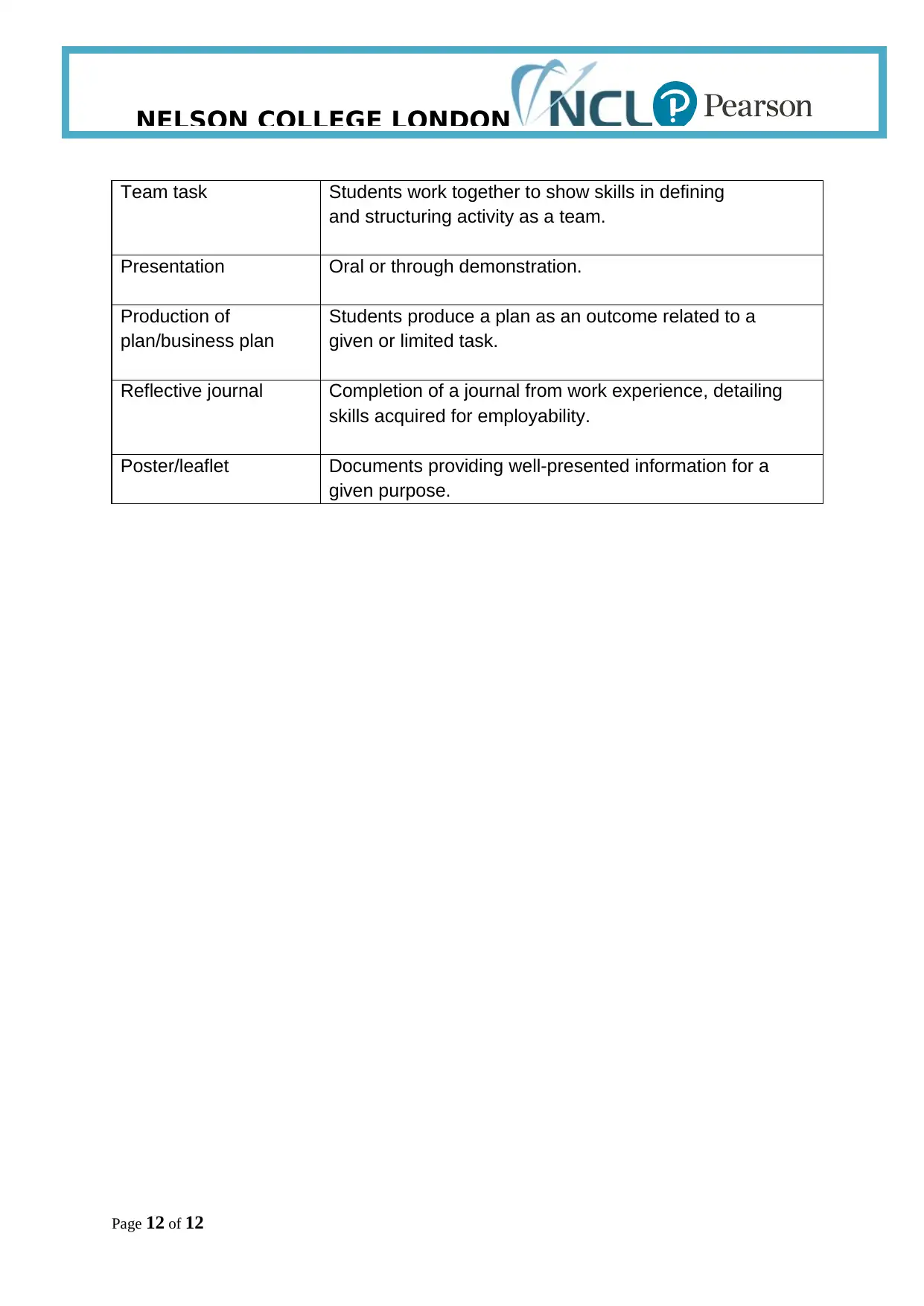
NELSON COLLEGE LONDON
Team task Students work together to show skills in defining
and structuring activity as a team.
Presentation Oral or through demonstration.
Production of
plan/business plan
Students produce a plan as an outcome related to a
given or limited task.
Reflective journal Completion of a journal from work experience, detailing
skills acquired for employability.
Poster/leaflet Documents providing well-presented information for a
given purpose.
Page 12 of 12
Team task Students work together to show skills in defining
and structuring activity as a team.
Presentation Oral or through demonstration.
Production of
plan/business plan
Students produce a plan as an outcome related to a
given or limited task.
Reflective journal Completion of a journal from work experience, detailing
skills acquired for employability.
Poster/leaflet Documents providing well-presented information for a
given purpose.
Page 12 of 12
1 out of 12
Related Documents
Your All-in-One AI-Powered Toolkit for Academic Success.
+13062052269
info@desklib.com
Available 24*7 on WhatsApp / Email
![[object Object]](/_next/static/media/star-bottom.7253800d.svg)
Unlock your academic potential
© 2024 | Zucol Services PVT LTD | All rights reserved.





